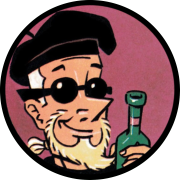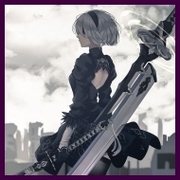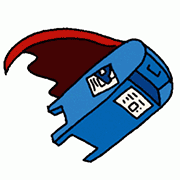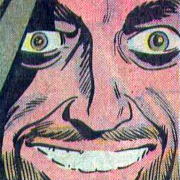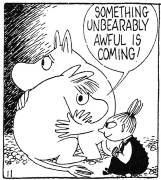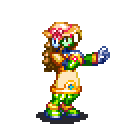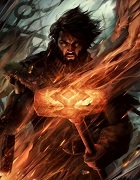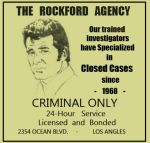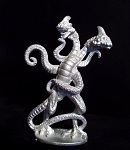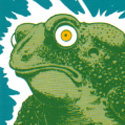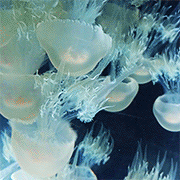|
I haven't even looked at the list, so that revelation is appalling
|
|
|
|

|
| # ? Apr 25, 2024 12:36 |
|
hup posted:I'm in (please be hellboy please be hellboy please be hellboy)  You got 187. Alias vol. 1. Great pull, one of my personal favorites. (Volume 1 covers issues 1-9 of Alias). For obvious reasons, this isn't on MU, but it is on Comixology Unlimited, and you can also just buy the volume outright on there for 17 bucks. Take it from me: it's worth it. Have fun! Lightning Lord posted:Why are there no BPRD stories on this list btw Send it in, you can e-mail them. They can only list entries people send in. Also, I coulda sworn there was at least one BPRD story on the list.
|
|
|
|
Lick! The! Whisk! posted:Okay, you're toxxing for both then. Reign is actually decent if you realize they meant his very touch was radioactive and not just his spider-cum
|
|
|
|
Roth posted:Alright, I finished Unthinkable pretty fast, so here are my thoughts. I'm still learning how to articulate my thoughts on comics, so my review isn't going to be anything special. The thing about Unthinkable is that Doom had already swerved pretty hard into the noble guy who just happens to hate Reed Richards characterization at that point. Wade went, "Hang on a second. Remember that he's completely ruthless and is more than happy to drop that 'nobility' to get what he wants." I think it works pretty well in that regard, except that it then leaves Doom in a place where he can't be used again without essentially ignoring the story which is exactly what happened. Rather similar to Magneto in Morrison's run where he went, "You guys do remember he's a terrorist and mass murderer, right?" Even when the story was published, people were mad about how it wasn't "their Doom".
|
|
|
|
Lick! The! Whisk! posted:Okay...
|
|
|
|
Roth posted:As for the art, I must admit, I really miss art like this in mainstream superhero comics. It feels like the majority of it goes for that kinda bland looking DC house style, where everything is drawn realistically, and any kind of art that feels cartoon-ish is relegated to comedy series. It works really well here, and it's nice looking at the vivid colors and exaggerated faces. That may just be a me thing though, because most people I talk to don't really like the look of comics from this era too much.  Lick! The! Whisk! posted:Send it in, you can e-mail them. They can only list entries people send in.
|
|
|
|
Captain America #250 So this starts with some terrorists in suits and sunglasses tearing up the meeting of the "National Populist Party", for no particular reason. Cap jumps in and saves the day in exactly three punches, and the incredibly 80s "Mr. Underwood" immediately comes up and starts gladhanding Cap, taking him downstairs to meet the rest of the party. Everyone he talks to personally has a story about how he saved them in the war, which is an interesting twist on his relationship with civilians that modern day Cap stories don't really have, by nature of the march of time. Within a panel, they're begging him to run for president; Steve demurs by saying he's "not much of a politician", but Underwood insists "people don't want a politician, they want a leader!" The rest of the issue goes pretty predictably from there: Underwood calls up the Daily Globe and gets them to run the story that Cap is actually running. Throughout the issue, Steve consistently refuses to even consider the idea, which is a fairly grounded way to show him actually living up to his ideals. On the surface it appears to be an apolitical story--one panel asks "where does he stand on minority rights, on aid to education, on housing?" but these questions are not answered. It's not overtly polemic in that regard; in fact, the idea the story is clearly reacting to--celebrity as a gateway to political power in lieu of actual qualifications--is put in the mouth of J. Jonah Jameson, predictably turning it into a punchline (Robbie Robertson brings up the possibility of Spider-Man running for mayor and JJJ practically swallows his cigar). But every panel gently pushes back against that idea--although, interestingly, Rogers' climactic speech turning down the nomination is not about his lack of experience, but his commitment to "the American Dream" and refusal to negotiate or compromise. Overall, a fairly important message woven into a fun, lightweight little story. (That said, the issue ends on a slightly bathetic note; as Cap literally walks away from the nomination, the viewpoint zooms in on a dropped sign, going from "Captain America for President" to just "AMERICA".)
|
|
|
|
Justice by Alex Ross and Jim Krueger A twelve issue limited series published from August 2005 to June 2007 by DC Comics Ranked #528 of 592 on War Rocket Ajax's "Every Story Ever" list as of 1/9/18. Summary: A collection of super-villains are having dreams of the world being destroyed by nuclear weapons, with the Justice League failing spectacularly to save anyone. This prompts the villains to band together to try and save the world themselves, while taking time to eliminate the League to keep from being interfered with. Despite the villains best efforts, the League survives, bands together with some allies, and discovers that the whole thing is a plot by Braniac with the villains as his catspaws. Braniac is defeated and the world goes on. Review: Context matters. Who you are and what you've experienced influence how you react to things. Like LtW, I'm a fan of War Rocket Ajax and their Every Story Ever list. It's often an amusing and educational listen, particularly if you're interested in the history of comic books as I am. But, as it happens, I haven't managed to listen to whichever episode of the podcast was the one where they ranked Justice, so I can't say for certain why they ranked it so low. But I can guess. You see, Chris Simms and Matt Wilson (the duo behind WRA) are, at their hearts, DC guys. Simms started his writing career as "The World's Foremost Batmanologist", and Wilson has often expressed his deep affection for Superman. They read other publishers, of course. Simms has even written X-Men comics for Marvel, and the top spot on the ESE list is a Spider-Man story. Nevertheless, they are first and foremost DC guys. I, on the other hand, am a Marvel guy. I grew up reading X-Men instead of Justice League. Like Simms and Wilson, I crossed publisher lines from time to time. I read Legion of Superheroes, and have a nostalgic affection for the late '90s Waid Flash run as well as PAD's Young Justice. But that was a mere dalliance compared to the boxes of X-books, Avengers, Hulk, Captain America, and other Marvel offerings that I've scooped up over the years. I've absorbed more DC material from the secondary media, like the Batman movies and especially the Batman, Superman, Justice League, Teen Titans, Justice League Unlimited, and Young Justice cartoons than I ever have from published DC books. Which is a long way to go to say that I don't have nearly the emotional connection to the DC characters as I do to Marvel ones, and as such the problems in this series are less likely to strike me as mortal insults to beloved icons than simply poor choices in story execution. The biggest of those problems its ambition. It shoots for the moon, but blows an engine before leaving the atmosphere. To explain why Justice aimed so high and failed, we have to talk about its predecessor. Let's look back at Kingdom Come. Kingdom Come was written by Mark Waid with art by Alex Ross. Though it has become more common in recent years to deride Kingdom Come as overhyped, indeed it only ranks #417 on ESE, its hard to overstate how big of a deal it was within the comics community of 1996. Kingdom Come was a story set in the future of the DC universe, one in which '90s style shoot first "heroes" are nearly as bad as the villains they oppose. Superman comes out of retirement to lead an army of classic heroes to try and clean up the world. It was thematically dense, exploring topics such as legacy, the use of violence, and the effects that a world full of the superhuman has on the regular humans of the world. Being set in the future allowed Waid the freedom to inflict serious consequences in his story, leading to Kansas getting nuked (twice!) and a high death count, including a lot of major characters. It was also kind of pretentious and somewhat up its own rear end much of the time, but it nevertheless had something to say about the comics of the mid nineties. If it hasn't aged as well the further away we get from the excesses of that decade, it's still a story that I feel holds up overall. A decade after the success of Kingdom Come, Alex Ross (or possibly the higher-ups at DC) decided to try and repeat it with Justice. That they were trying for the same impact is pretty clear when one looks at the covers for Kingdom Come...  ....and Justice.  Justice tries really hard to be that successor story to Kingdom Come. It wants to talk about how those with superpowers could do so much more for the worlds than just fight other people with superpowers. It has the villains figure out all the Leaguers' secret identities and uses that knowledge to try to destroy them. Its got Grodd and Luthor and Brianiac all conspiring with and against one another. It has fights and tragedy and noble sacrifices, and it's all set in the modern DC universe right now! ...which, ultimately, is why it fails. Because, unlike Kingdom Come upon which it's based, Justice can't be allowed to have any real consequences. Wonder Woman is poisoned and killed by the hydra poison that killed Hercules! Oh, Hippolyta prays real hard and brings her back from the dead. Aquaman gets his brain cut out by Braniac! Oh, wait, it turns out he can regrow his brain. Every member of the League has his or her identities exposed! No, Green Lantern wipes the memory of it happening from everyone in the world. The supervillains are using their powers to actually help the world in ways that the superheroes never seem to be willing or able to do! Oh, wait, its just a Braniac scheme to mind control people into becoming his subjects. This last one is particularly galling, because things like having Captain Cold go out into marginal lands and create an ice mountain that melts and provides clean water to people are actually pretty neat. But the story ends up discrediting such actions because they must be part of a supervillain plot. That's not a problem limited to Justice or DC, of course. Superhero comics want to have a world recognizable to the reader. If you let your heroes and villains do more than punch one another, they'll rapidly transform the world into someplace too unlike the real world in which we live. So instead of Reed Richards inventing tiny supercomputers that everyone can use, the people of the Marvel universe still use IPhones because that's what the readers themselves are familiar with. Thus Ross and Krueger jam the Reset Button until their fingers bleed to keep the DC universe similar to our own world.  Which is disappointing, to say the least. Nearly as bad, though, is the fact that the end of the story is rushed. It's an odd thing to say about a twelve issue series, but it really feels like Ross and Krueger just ran out of time and slapped an ending on the story. Not only does the ending undercut all tension in the previous issues by resetting, it does so badly and in a hurry. Villains who were deadly threats to the heroes in previous issues are dispatched in less than a page. Big reveals are either given not enough page space to have impact, or come out of nowhere and are nonsensical. Its a goddamn mess and leaves the reader (or at least this reader) saying "wait, that's it?" So I absolutely hated this assignment and fully agree it deserves its place as one of the worst stories ever, right? Well, no. The thing is, Justice does have a lot going for it. For one thing, the art is gorgeous. I know that not everyone appreciates Alex Ross' art. He paints his work using live models, a time consuming process that gives a more realistic look than one expects in a comic book. Not everyone likes that look, but it's always worked for me personally. So visually it was mostly good and there are pages and panels that could be considered great. Some of the ways the heroes are initially attacked and how they counter attack at the end are reasonably clever. Also, the early issues where the villains have the initiative and the heroes are losing left and right are quite effective at building tension. That the later issues piss that tension away doesn't change the fact that the first few issues do a decent job of making you feel that maybe this could be something important happening. As I mentioned earlier in the thread, I read library copies of this series. What puzzled me early on was that while ten libraries in my local area had copies of Justice volume one, only three of them had volumes two and three. Now I know why. Book one is actually quite good, book two is decent, but book three is just awful. And here's where my being a Marvel guy probably scores Justice some points. Because I'm lacking a really deep emotional connection to any of these characters, Justice strikes me as less of a huge disappointment than it probably did for DC people who read it through 2005-07. I didn't go into this hoping for a huge revolutionary story about a world I loved. I came in expecting sheer awfulness and only got it in the last few issues as the thing came apart at the seams. For the first 2/3 of the story I was rather entertained by it.  So no, I don't think Justice deserves to be as far down the list as it's been placed. For that matter, I don't think Kingdom Come deserves to be as far down the list as it is either. I could see bumping both stories up 50-100 places or so. Justice probably deserves to be in the 400s somewhere, in the land of mediocrity. I'd put Kingdom Come in the low 300s somewhere in the reasonably good range. Thus Justice, a story that could have been great if they'd had the courage of their convictions, could have been at least good if they'd managed to stick the landing, and ends up being just kind of there because they failed at both, but preserved from true awfulness by the quality of the art.
|
|
|
|
|
Are we required to discuss the Every Story Ever ranking in the review, because I don't really care about where it was placed and plan to just review the comic in question
|
|
|
|
Lightning Lord posted:Are we required to discuss the Every Story Ever ranking in the review, because I don't really care about where it was placed and plan to just review the comic in question Nope.
|
|
|
|
Iím in, this is a fun idea
|
|
|
|
Zeeman posted:Iím in, this is a fun idea  You got 327. Fear Itself, the crossover event basically nobody talks about except negatively. Oh boy! Have fun, all issues are on MU.
|
|
|
|
Lick! The! Whisk! posted:
Oh man, I read the Journey into Mystery issues that tied in with it (which were great), but I don't think I ever bothered with the actual crossover.
|
|
|
Zeeman posted:Oh man, I read the Journey into Mystery issues that tied in with it (which were great), but I don't think I ever bothered with the actual crossover. I remember parts of the x-men tie ins being pretty good. Some funny moments.
|
|
|
|
|
bagrada posted:I remember parts of the x-men tie ins being pretty good. Some funny moments. Yeah, X-Men was pretty good. 
|
|
|
|
Roll me a number please!
|
|
|
|
Iím stoked for mine because Iíve never actually read Alias. I really enjoyed Jessica Jones on Netflix, though.
|
|
|
|
Fritzler posted:Roll me a number please! You get 301. The Mighty Thorcules. Covering The Incredible Hercules issues 132-137, this run reintroduced the now-Hulk, Amadeus Cho! An, in retrospect, incredibly important run of comics. Its all on Unlimited.
|
|
|
|
Fuuuck I loved Incredible Herc.
|
|
|
|
hahahaha is Amadeus Cho the Hulk atm? comics are so weird man but yeah thatís a good story
|
|
|
|
Lick! The! Whisk! posted:You got 157. Flash 91. I have literally no idea which volume that references and there's not an episode reference so I can't check, but I'm PRETTY sure its from volume 2, and considering that's a Waid comic it makes sense to be placed that high knowing Matt and Chris's tastes. Also,since golden age 91 is a fuckin' Hawkman comic and who wants to read a Hawkman comic? Either way its on Comixology.  It's funny how some things just permeate your subconscious to the point you forget they're comparatively recent inventions. Youtube wasn't invented until 2005, there was a time that you looked things up online by "searching" rather than "googling", and friending somebody meant you got to know them, like them, and spend time together. Now that I've established I'm old and frightened, I'll move into the context of this thread. I've always been more of a Marvel fan than DC, but DC's big heroes are iconic enough that there are certain things I've always "known" about them. Superman comes from Krypton and is faster than a speeding bullet; Batman's parents were killed when he was a child; Wonder Woman was sculpted from clay; and of course the Flash goes really fast because of something called the Speed Force. Except... no he didn't. For the first 50+ years of the Flash's existence, the various characters who held the mantle got their powers either from magic or science experiments gone awry. Wally West - the Flash of this comic - got his powers in a repeat of the lightning/chemistry accident that gave Barry Allen his, all of which was just an excuse for there to be a Kid Flash since superheroes need teen sidekicks, everybody knows that! This particular comic, written by the excellent Mark Waid, explores an idea that would very quickly become embraced as the true origin of the powers of not just the Flash but nearly all of DC's super-speedsters. There is a "Speed Force", a barely understood force of energy that certain individuals are able to tap into to vastly increase their speed and their perception. This is just something I've "always" known, it's a "fact" of the DC Universe but until very recently it never existed. Hell, even in this particular issue it is barely addressed outside of Wally scoffing at the very idea - his Uncle Barry never knew about the Speed Force, and his Uncle Barry knew everything! The issue opens with Wally speeding across a bridge during what he mockingly calls "rush hour", as a group of thieves using a small high tech rocket sled ambush a truck full of Wayne-Tech microchips (wow!) but get spotted by a passing police helicopter. Wally has been undergoing a minor crisis of confidence recently, feeling like his super-speed isn't quite enough - as fast as he is, he can't be everywhere at once and sometimes he has to make a choice to save one person over another, a choice he just can't live with. So he has "made" another speedster called Johnny Quick teach him a formula that Quick uses to move at super-speed as well, and uses it to vastly increase his own already remarkable speed. But nobody quite knows what the result will be when the two speeds combine, so Wally has agreed to only use it in an emergency. He figures the rocket sled causing the police copter to go on a headlong collision with the bridge fits that requirement, but when he uses the formula while going at top speed:  Time seemingly comes to a stop, though Wally quickly realizes that he's actually just moving so incredibly, unbelievably fast that everything else appears to be at a standstill. To his surprise, he finds this requires no effort, he can casually wonder about and his body feels absolutely normal. To his horror, he also finds he has absolutely no idea how to reverse this process. Even worse, the helicopter he intended to save is "frozen" too close to the bridge and far too heavy for him to do anything to save them. He doesn't have super-strength either, so he couldn't force the doors open - he cannot save the people inside. He blames himself, he took a moment to save a woman from falling off the bridge, which caused him to panic that he wouldn't get to the copter in time, but now that he has frozen it, he's still powerless to help. I'm a big fan of Mark Waid's writing, and I was delighted to see Mike Wieringo was the artist on this piece. This is not, however, the Mike Wieringo I am used to. Obviously earlier in his career, the art here is unremarkable, done no favors by the muted coloring. Flash is drawn as a stocky meathead as opposed to the lean figure you'd expect from somebody whose metabolism runs so fast. The page compositions are competent but unexciting, though you can see some interesting elements trying to slip past the editor's eye - characters and vehicles break frame borders at times to further generate the idea of motion/speed and the suggestion of three dimensions. It's nothing revolutionary, but knowing where Wieringo would end up before his too soon death, you can see how his style was developing and how he would eventually become such a fantastic and well-respected artist. The same goes for Waid, whose writing comes from a well-intentioned place but doesn't quite pull off what he is going for (he would get much, much better). The Flash, realizing he can't save the copter's occupants, just kind of wanders off and meanders about Keystone City taking in the sights while giving straight up exposition about his thoughts and feelings. Yes it works to bring an unfamiliar reader like myself up to date with what he is thinking, but it feels very artificial and just draws my attention to the fact it is a comic. Show, don't tell - Waid should know that even at this early stage in his career, when he'd been writing for close to a decade already, and his excellent late 90s work wasn't that far off. Still, his sense of comedic timing was still spot-on:  Max Mercury - a fellow speedster gifted his powers by an Indian Shaman in the 1830s (oy vey) - is obsessed with the idea of the Speed Force, but his attempts to access it have seen him shoved around in time both past and future. With an affinity for Wally that sees him serve as a kind of surrogate mentor after the death of Barry Allen, he sensed Wally's sudden vast increase in speed and sped up himself to find him. Unlike Wally, Max has to burn a huge amount of energy to keep up the pace with him, but he takes the opportunity to provide some mentorship advice. He points out various tragedies both averted and not throughout the city that happened while Wally was over at the bridge, making the point that Wally can't let himself get torn up inside because he wasn't able to save EVERYONE ALL THE TIME. Wally takes it to heart, acknowledging that he knows this intellectually but he's having a hard time getting to grips with it emotionally. Every dead body he sees makes him consider what he might have been able to do given his speed. When Max starts trying to talk about the Speed Force, Wally brushes it off like a relative or friend who suddenly starts talking about religion out of the blue. Max can't hold out any longer and freezes up like everybody else, but Wally has been given the kick up the rear end he needed. Yeah he can't save everybody, but he can save who he can, and sometimes that also means thinking outside of the box:  It's an obvious solution, using the escaping rocket sled to halt the downward momentum of the copter AND prevent their own escape as the cable swings them back around and leaves them dangling captives of the cops. Flash should have thought of something like that immediately but the shock of the "freeze" and his own personal issues meant he had to get there the long way around. It makes sense, for a character as fast as the Flash the best way to restrict his effectiveness is for his confidence to be shaken so he isn't on top of his game, where he would be unstoppable. Having accomplished his goal, he "releases" the super-speed he has accessed and shifts back to the same speed as the rest of the world, effectively gaining greater control of his speed even at the souped-up level the formula provides. Flash looks about to Max but isn't surprised to see he is gone, and for the first time starts to ponder if maybe there is something to this whole Speed Force thing after all. The first tentative steps towards the Speed Force would probably be enough to warrant marking this comic as an "important" one, but there is more to it than even that. In a brief epilogue, a mother and child in the year 2995 are shown escaping Science Police through a time machine. The final panel reveal is that the person escaping was Iris Allen, the wife of Wally's predecessor Barry (it's far too complicated to explain why she's in the 30th Century), determined to get away due to the Earth Government lying to "them". Who is them? We don't see who the child is, but the eventual reveal would be that this was Barry's grandson Bart Allen, who would become better known as Impulse and later the new Kid Flash. As a result, this issue stands out as a major turning point in the life of the character, establishing brand new information that would quickly come to be seen as integral parts of the character you'd almost think had ALWAYS been present. That makes this comic greater than the sum of its parts, even if at the time it came out it would have probably been seen as a relatively generic and even uninspiring standard comic-book issue. Jerusalem fucked around with this message at 11:13 on Jan 11, 2018 |
|
|
|
Lick! The! Whisk! posted:You get 301. The Mighty Thorcules. Covering The Incredible Hercules issues 132-137, this run reintroduced the now-Hulk, Amadeus Cho! An, in retrospect, incredibly important run of comics. Its all on Unlimited.
|
|
|
|
Fritzler posted:I'm getting ready to start reading, but just to clarify, The Incredible Hercules introduced Amadeus Cho, not 132-137, right?
|
|
|
|
My assignment was to read Avengers: The Kang Dynasty, an arc towards the end of Kurt Busiek's run in the late 90s. I don't know nearly as much about the context of this time period as other reviewers, so I can only speak to my own feelings about the work itself. I realized reading this that I know almost nothing about the Avengers, despite considering myself a Marvel guy for years. Basically, I kept being surprised by how tight the relationship between the Avengers and the United States government was; how many members I'd never heard of; how many members I thought were on the team weren't, or were actually enemies (at least at this time period, like the Hulk). My vision of the Avengers is apparently influenced a lot by the NES Avengers game, where there were 4 members--Captain America, Iron Man, Vision, and Hawkeye. And I knew from random Marvel lore that there was Wasp and Ant-Man, but I was not prepared for the sheer number of Avengers who I'd never even heard of-- 1. Triathlon (and the three unremembered Avengers he mentions whose company he believes he'll fall into--Mantis, Rage, and Deathcry) 2. Photon 3. Stingray 4. Firestar 5. Jack of Hearts ("whose zero-blasts are enough to shatter moons")?? 6. Justice 7. Firebird 8. Black Knight 9. Wonder Man--I'd heard of this guy but don't know anything about him 10. Silverclaw ("Silverclaw shifts into giant-sloth form--her most powerful incarnation")?? 11. Living Lightning 12. 3-D Man!? I guess maybe not technically an Avenger, but still  There were even more members that I'd heard of vaguely, like Quasar, but also people like Quicksilver and the Scarlet Witch, who I thought were mutants and would be on some X-team, not the Avengers, who for some reason I thought just never had mutants. Anyway, so I knew basically nothing about the above characters, and not a ton about what led the ones I had heard about to their current characterizations. But I felt Busiek did a good job--nothing struck me as particularly egregious on the ones he focused on, like Warbird, even though her history I'm sure I don't know the first thing about. My main connection with her is that Rogue stole all her powers. But then she apparently got those powers back, or different powers, or something. So anyway, the whole premise seemed a bit goofy, with Kang showing up from the future (the 40th century?) lounging on his floating pillow with a massive invisible sword shaped doomstation in Earth's orbit, telling the assembled heroes about a number of threats that are coming and how he needs to conquer the Earth to protect it from those threats. Then he blows up the UN but saves all the people in the building to prove some kind of point about him not wasting lives needlessly, before announcing his explicit goal is to create mass chaos across the globe which will of course lead to uncountable casualties on his behalf as factions fight the established nations to get a place in Kang's new world order. And then later on, he just obliterates Washington DC anyway, annihilating millions. I'm curious if this reverberates through future comics at all--I know the President got out safely, but I feel like I should maybe have heard of DC being destroyed in the Marvel universe and I never had. I get the feeling it was supposed to be chilling and a Big loving Deal, but I'd never heard of this happening. It was done in the silent issue, which was cool--the silent G.I. Joe issue is justifiably a classic and I thought this 'Nuff Said issue was decent. Also, about the premise--I don't really understand Kang's time travel abilities because it seems to me that if Kang was losing, he could just go back in time and change the thing that caused him to fail if he wanted to succeed. It doesn't make a lot of sense to me how a guy like him could ever fail if he didn't want to. I know it's a comic book, and Kang was supposed to have 'honor' (again, destroying millions of innocent lives seems counter to this) and the whole relationship with his son, the Scarlet Centurion, but it just seemed odd. Like, he had all this technology from the future but then couldn't actually time travel back in time to ensure he didn't lose this massive invasion he'd meticulously planned.  Part of the run included an Annual that centered around Hank Pym and was largely lost on me because I have no relation to that character and very little knowledge of his history. So the fact that the Annual led to him reunifying mentally with these three different versions of himself didn't make me feel much and felt unearned--but if I'd been following the character for years, maybe it would have felt really satisfying. I saw the domestic abuse thing get referenced--at the time of the issue, in 1998 I believe, it would have been close to 20 years in real life time since that event had happened--how long was supposed to have passed in Marvel years for it to still be such a huge mental issue for Hank? Anyway, felt I wasn't really the intended audience for this scene and maybe it would have been touching otherwise. There was this other villain type guy who popped up to protect the world from Kang with his advanced alien technology named "The Master of the World". His motivation was kind of cool--sort of a Raz al Ghul vibe, making sure that the wrong people get elected so the population can be culled. But then he gets murdered the issue after he shows up by Warbird, who just grabs a chunk of metal and stabs him to death with it to very little comment. After which, the heroes all steal his advanced alien tech to fight Kang with. The rest of the arc is Warbird dealing with what she did, but it seemed a little half-hearted how upset she was with herself, given literally nobody else felt she'd acted wrongly at all. Then after Kang is defeated, she insists on a court martial for herself, where everyone tells her she's being an idiot and what she did is fine because it was wartime or something. I feel maybe I'm missing something with Warbird's character that was probably explored prior to where I jumped on board the Avengers, since I felt it didn't really seem like anybody else cared about what she did, and she cared about it so much. The government in this arc decides to send Sentinels after Kang, even though earlier it's mentioned that every single time they've ever been used in the past, it's led to some sort of disaster. So of course they send them after Kang's space station and I can only imagine them from the 90s X-Men cartoon--ineffective and played for laughs, but it's hard to imagine what the 75 robots they built could possibly do against Kang's future station anyway, when the Avengers failed to penetrate it with their crazy powers. I mean, has there been one superhuman in the entire history of Marvel comics that the Sentinels have actually managed to kill? So why would they think they could pierce the forcefield of a 40th century battle station? And either way, this was a cheesy as gently caress moment where it's presented that Kang had time traveled to when robots were invented and planted a failsafe in EVERY robot ever created except "the Vision and the android Human Torch" (thanks for that oddly specific reference, Kang) so that with a command, he could control any robot at will, including these Sentinels which he sends back to Earth to get destroyed by the Avengers anyway. It's not clear how much time passes between when Kang destroys DC and the US surrenders and when the other heroes come back from space, but it's enough time for there to be prison camps and rebellious groups and things like that. The pacing wasn't great in this part--I would have liked to have seen a little more Days of Future Past type desperate bands of hunted heroes. Thor is still free though and ends up rescuing some people and turning the tide. Speaking of Thor, early on in the arc, Thor is fighting some radiation ghost guys with Captain America and others, and everyone else falls and becomes radiation ghosts. Thor is shaken by how much he's affected by this--obviously, Captain America gets turned back to normal, but it shakes Thor because as an immortal, he knows the mortals he pals around with are going to die someday. This preoccupies him for most of the arc, until the end, when he makes a nice little speech about how mortal lives DO matter, even though he's immortal. And he brings a feast to Avengers Mansion to celebrate Kang's defeat. I felt Kang's defeat was kind of stupid because after sending his son in a time escape pod to the future, he gets captured. Then his son rescues him, and Kang reveals to his son that he's the 22nd Marcus, and the others are all in his private chamber, dead in glass coffins. And Kang kills this son because he'd helped Warbird out earlier, which led to their defeat. Again, I don't understand time travel or its limitations, because it's nonsensical for a father to have 22 adult dead sons who have failed him for various reasons. Using time travel shenanigans, his kids can grow fast, which they go over a bit, but still. And why the gently caress would you name all 22 of your sons Marcus? The other big thing in the ending was completely lost on me, since it centered around this Duane guy who from context was the Avengers' government liaison. But I don't think Duane featured in the arc at all, or if he did, it wasn't very memorable, and I guess he died in the DC explosion, but that also wasn't really pointed out anywhere. So his death I guess was supposed to add gravitas to everything, but it didn't work for me at all because I had no idea who he was or what relationships he had with the Avengers who were so bummed out about his death. It seems chickenshit to have a civilian die to lend weight to the story when you had so many--SO, SO MANY--heroes who could easily have made the ultimate sacrifice instead. Overall, it was a fun read and was more sophisticated than I thought it would be--one of the other reviews mentions Busiek being sort of a very solid master of the comic book formula, and I really agree with that. In this arc, it feels like a good hero book, despite the criticisms above. It's one of those things I'll never re-read because nothing in it really resonates with the real world in a meaningful way, but I don't regret my time with it. I'm really curious what the people who put this on their list at 271 thought about it, what made them think this is even that worthy. Like, what moments made them think this was better than 2/3 of the other stories on their list? And of course anyone in the thread who's familiar with it--maybe I'm missing out on a lot of subtle and cool things because I'm not very familiar with the characters. But that's a ding against the comic in my opinion.
|
|
|
|
Okay with the weekend coming up and with my previous one just a single issue, hit me again. I've got a good feeling about this one. (I'm totally getting a really bad Batman story instead of just the extremely mediocre one I had last time, aren't I?) Random Stranger fucked around with this message at 03:36 on Jan 12, 2018 |
|
|
|
Wednesday is new comics day so I picked up my Devil's Day and... oh god. It deserves its ranking. This is gonna be fun to write.
|
|
|
|
Random Stranger posted:Okay with the weekend coming up and with my previous one just a single issue, hit me again. I've got a good feeling about this one. In a similar boat, please hit me again if you'd be so kind.
|
|
|
|
Hey, I was looking for a writing project to take my mind off profound boredom. As a super casual comics fan, hit me up and may Kirby have mercy on me.
|
|
|
|
CapnAndy posted:That's correct. You're gonna jump on mid-run and at sort of a silly point too, so just... go with it I guess?
|
|
|
|
Random Stranger posted:Okay with the weekend coming up and with my previous one just a single issue, hit me again. I've got a good feeling about this one. Nope! Instead you get...  437. Supermanís Girlfriend, Lois Lane #106 "I am Curious (Black)!" The issue where Lois Lane learns that racism exists! This issue is nearly impossible to find so if you want a re-roll let me know. Jerusalem posted:In a similar boat, please hit me again if you'd be so kind.  You get 163. Superman and Batman: World's Funnest (titled Mr. Mxyzptlk and Bat-Mite: Worldís Funniest on the list for no discernable reason). This is the prestige one-shot comic from 2000 written by Evan Dorkin, but as far as I can tell it isn't available as a single issue except on Amazon. Comixology has a trade with it inside titled, appropriately, World's Funnest, but we're only considering the single prestige one-shot comic contained within. Dias posted:Hey, I was looking for a writing project to take my mind off profound boredom. As a super casual comics fan, hit me up and may Kirby have mercy on me.  You get 355. Batman #417-420: Ten Nights of the Beast. This is our first repeat number so far, so I'll give you the option of either accepting this or having me re-roll until we get something that isn't a dupe. Your choice.
|
|
|
|
Since we've had enough rolls that this has an increased chance of happening, I need you to clarify when you roll whether or not you want a dupe. Please specify "dupes okay" or "no dupes" if you're requesting a spin.
|
|
|
|
Lick! The! Whisk! posted:Nope! Instead you get... Don't worry. I already have it. That's not something I should have admitted, isn't it. Edit: But since it's a single issue and I am pulling it out right now with a free hour or two so there isn't going to be any trouble getting it do. Hit me, again! I don't think I'm going to bust.
|
|
|
|
Random Stranger posted:Don't worry. I already have it. Man, browsing online that seems like a fairly expensive backissue. So, well, nice.
|
|
|
|
Overview Our protagonist, unnamed throughout the story, wakes up in an all-too familiar place. However, as time passes, he begins to realize small, subtle changes around which seem to point out that not everything is all right. Facing his deepest fears, he will struggle to find a way out... of where? Overall impression The comic plays with the fish-out-of water goofy character suddenly finding himself out of his place, both really and metaphorically. As he faces his worst fear, he becomes little more than an avatar, a vehicle for the reader to project themselves in. And so, we follow him along a series of increasingly disturbing realizations. This is not his home. There's nobody around. This is not his time. The episodic nature (at the time of its release) of the comic does not help matters, as every issue ends in a cliffhanger. The ending is also nebulous: was it all a dream? Is he (are we?) safe, back to an all-familiar world? Or have we become irremediably lost in nowhere? Are we damned to an existence without all we love? Without ourselves? No answers are given. At the time of its release, the ambiguous ending prompted a myriad of alternate interpretations, and an urban legend that would become even more famous than the strip. In accordance with the story, the usually rather colorful art style is also twisted around. Colors are darkened, with overabundance of purples and blues, and inked over, and dramatic angling is used for a lot of the scenes. As the protagonist starts confusing his memories and perceptions, so the coloring switches between bright and dark. The effect really adds to the overall feel of the story. Veredict I have not read it in its original format, so a lot of its original impact may be lost on me. Today we know what was really going on in the cartoonist's mind (which to be honest, it is not that interesting in itself - he wanted to do a different Halloween story and asked "what is your deepest fear?" to a bunch of people, then drew six consecutive strips dealing with the most common answer). We also know that the ambiguous ending is just that, purposefully ambiguous; no ghost legends or conspiracy theories attached. It is a piece of urban story in itself, moreso for what it represented than for its artistic or narrative value. Just for it, though, it deserves a place on the "good" zone of the list. Though, more than good, it is just odd and out of place. We are all Garfield and we are all alone. (There it is, I reviewed a Garfield strip. Please, spin me something, no repeats. I hope I get a drat comic this time around) Shellception fucked around with this message at 20:57 on Jan 12, 2018 |
|
|
|
Lick! The! Whisk! posted:
|
|
|
|
Superman's Girlfriend, Lois Lane #106 Nov. 1970 "I Am Curious (Black)" Written by Robert Kanigher; Pencils by Werner Roth; Inks by Vince Coletta "Wonder Women of History: Martha G. Kimball"; reprinted from Wonder Woman #53 Not credited; probably written by Robert Kanigher and I have no clue on the artist "Where Do You Plant a Thorn?" Written by Robert Kanigher; Art by Ross Andru and Mike Esposito I guess we have to start with the infamous cover to this issue:  With that out of the way, this is actually a pretty important comic. It's not good. Definitely not one I'd recommend hunting down yourself. But it is a comic that emerged at a moment of transition for the comic book industry and it reflects all those changes, along with all the problems that came along with them. There's a lot of background I need to cover first. I'm going to assume that everyone reading this knows the basic history of race relations in the US and how things stood in mid-1970. The direct inspiration for this story is John Howard Griffin's 1961 book Black Like Me; Griffin was a white journalist who darkened his skin and then traveled the south so that he could experience the effects of segregation and racism firsthand. The book was a massive success and was a touchstone at a time when segregation was under attack. I haven't read the book myself, so I can't draw direct comparisons, but it's a sure bet that Kanigher was drawing on that kind of reporting for his story. There's a less serious, but also very significant thing about this issue. So Marvel Comics came along in 1961 and if you read the bullpen pages through the period you'd think they immediately became the dominant force in comic books. Well, despite the response of the pop art crowd to Marvel, DC was still outselling them by a huge amount. However, Marvel was taking a larger and larger cut out of DC's sales and by the end of the 1960's it had become clear that gorilla covers weren't moving books any more. Rather than just write silly little stories for kids, they decided to become more like Marvel. More melodrama, bigger action, more "serious". It was only a year after this book that DC made their first attempt to "reboot" Superman. And part of this time of change was bringing real world social issues into the books. One sign that this wasn't "just for kids" is that title right on the cover. I Am Curious (Yellow) and I Am Curious (Blue) are a pair of Swedish films that became very well known in the late 60's for their sexual content. That title on the cover is the equivalent of the winking sexual innuendo in a Dreamworks cartoon; it's a de facto sex joke on the cover a Lois Lane comic. Which brings us to the issue of diversity in comics. You'd have to look awfully hard to find a creator at Marvel or DC up to that point who wasn't a while male and the books reflected that level of diversity. Now being a white male myself, I'm not the person to really dig into this beyond superficial levels, but the fact is that comics dodged depictions of racial issues is a problem. They didn't need to have polemic, shallow "racism is bad, kiddies" stories every month, but ignoring the most significant societal shift in decades is a problem. Marvel was better than DC in this regard, I can actually think of a small handful of stories that tackled racism that Marvel had while I cannot think of a single one for DC that predates this issue. Things were changing, of course, and DC would soon have Green Lantern/Green Arrow and Teen Titans clumsily groping at social relevance with other books occasionally dipping their toe in. In the 1970's DC would feature a ton of old white guy creators trying to be socially progressive in order to appeal to modern kids, and that well intentioned ham handedness starts here with Lois Lane. (I could go one for ages about the horrible things with unintended messages DC published in the 70's in an attempt to be "progressive". They decided in not one but two different series that the best way to explain why there weren't any black people in the world was to say that segregation was good.) So, that's enough pre-amble. Let's talk about the actual issue and it opens with a bang: Lois Lane #106 posted:Black Lois: "Look me straight in the eye, Superman! And tell me the truth! Will you marry me? Just the way I am?" The book hits you on page one that Superman is racist. He might be fine with those black people getting to vote, but he doesn't want Supergirl to bring one to the Fortress of Solitude. Lois Lane has an assignment to get the story of the neighborhood of Metropolis known as "Little Africa". The captions describe it as "Metropolis' black community" which implies that Then there's actually a pretty good bit (seriously) where she walks past Dave Stevens, a community organizer, giving a speech that calls her out. "It's okay with her if we leave these rat-infested slums! If we don't move next door to her! That's why she's our enemy!" The thought balloon Lois has says that he's wrong, but we haven't really seen behavior from Lois that contradicts what he's saying. Lois convinces Superman to use a shape shifting machine he keeps in his fortress to turn her black and Lois wears "afro attire". And then there's the statement that really sums up the problem with this story: "I'll really be accepted! Learn the inside story of what it means to be black!" She's spending a single day as a black person and spending it in their segregated community. (Funny aside here that I forgot. This isn't the first time that Lois Lane spent 24 hours as another race. In the story that introduced the device that she uses, Lois tries out a few different bodies in a suspiciously fetishy sequence before the reverter breaks down and she's stuck as an Asian woman for a day. Nothing comes of this and we don't even see Lois doing anything as an Asian woman as the story cuts to a week later. I did not make any of that up.) The racism starts quickly as Lois can't get a cab and has to take the subway. As part of a trip to an apartment to observe the filthy living conditions, she sees that the residents of "Little Africa" just pile up their trash in the hallway where it can catch fire (the slumlord won't hire a janitor, but why is there a mountain of trash in the hallway?). She encounters Dave Stevens again as he leads a chant of "Black is beautiful!" (which was a popular slogan at the time, of course). Dave gets shot interrupting a drug deal (hey, there's the comics code loosening up), and Lois gives him a blood transfusion to save his life. Right after the transfusion, Lois confronts Superman and this is another time that the book gets it right. Lois Lane #106 posted:Superman: "You ask that of me... Superman? An alien from Krypton... another planet? A universal outsider? I don't even have human skin! It's tougher than steel!" Right then the change wears off. They're still in the hospital and Lois has to go talk to Dave again as a white woman. He called her out before so Lois is scared to reveal the deception. Dave is first shocked, then smiles and embraces her hand. Okay, that's a hell of a lot more of a synopsis than I wanted to give, but I feel like for this story it's kind of important. The devil is in the details here and there are some genuinely great moments mixed in with some really unfortunate missteps. The doctors and nurses at the hospital are all African-American so that's good for depiction, but it also implies how heavily segregated Metropolis is. The climactic moment of the book places the responsibility for racism on the Dave; it's up to him to overcome his racism. But there are those moments that I've singled out because they hit the right notes. Roth's pencils for this book are actually pretty good. Particularly the last, wordless page of the story. There's some nice touches like a guy giving Black Lois (look, you kind of have to call out her race for this story) an angry side eye on the subway. The facial expressions aren't perfect on every page, but they're better than I usually see in comics from the era. Vince Coletta for his part doesn't screw up the art. So, this is a clumsy story. It's well intended and occasionally succeeds in its message, but it doesn't have the courage to really drive those points. There's more depictions of racism toward White Lois than Black Lois. Still, its heart is in the right place and if DC had been able to grow from here then maybe their 1970's books wouldn't be the terrible missteps that they are. This is much better than the stories where a superhero brushes up against a social issue, gives a brief speech, and then it's assumed that everything is better forever. But there's still two more stories in the book! I'll be briefer. "Wonder Women of History: Martha G. Kimball" is a two page profile of a US Civil War nurse. She followed General Sherman and proposed Memorial Day so it's her fault that we get terrible movies at the end of every May. This is incredibly slight and doesn't even rise to the level of elementary school report on a historical figure. The final story needs a bit more introduction because it's pretty obscure. Rose and Thorn was a superhero that debuted in the previous issue of Lois Lane and was part of a concept DC was exploring at the time where some of their older, crustier titles got a back up serial featuring a new, Marvel style superhero. The best of these is Manhunter, but we're not here to talk about him. Thorn was a woman who fought a high tech mob called The 100 (later The 1000; they were lower tier DC villains up through the 1980s) using throwing thorns that contained things like explosives or sleeping gas. Rose was an average girl whose father was just killed by them. The catch was that they were the same person; Rose would fall asleep and Thorn would wake up to prowl the streets. So "Where Do You Plant a Thorn?" is only her second appearance. The story starts with Thorn discovering a solid gold coffin with her name on it. It's a distraction for an ambush which she resolves by just giving the hit man a judo throw (I assume this is the resolution of the previous issue's cliffhanger). Rose's boyfriend it turns out is working for The 100, but there's a rival for her affection in a detective who is hunting them. When he buys roses for Rose at an evil florist, they poison the thorns, but Roses dog picks one up in its mouth and dies. The detective confronts the evil florist who lures him into a trap but Thorn shows up and literally pins the thugs to a giant cactus. This story moves at a breakneck pace (I actually reduced the plot points here and it's an eight page story). I like the idea of the evil florist and the fight in his greenhouse (all two panels of it) at the end could have been pretty cool, but we're rushing through everything. Andru and Esposito are a classic art team but this story doesn't showcase them well. It feels like, sorry to say this, a rush job. There are some really dynamic panels, but most of the story looks just off a bit. There's a reason that nobody remembers Rose and Thorn; stories like this do them no favors. Random Stranger fucked around with this message at 21:44 on Jan 12, 2018 |
|
|
|
Thatís a great breakdown of that issue. Thereís a surprising amount of on the nose anti-racism stuff in the early marvel years, but the most notable example I can think of is the 2 part introduction (and takedown) of the Sons of the Serpent. Not much in the way of actually good subtle stuff though and like 99% of characters are still white.
|
|
|
|
Jiru posted:(There it is, I reviewed a Garfield strip. Please, spin me something, no repeats. I hope I get a drat comic this time around)  You got 41. Top Ten #1-12. An Alan Moore classic! All issues are on Comixology as well as collected in a trade on Comixology.
|
|
|
|
I'll take a no dupes reroll just for the sake of variety then.
|
|
|
|

|
| # ? Apr 25, 2024 12:36 |
|
Dias posted:I'll take a no dupes reroll just for the sake of variety then. (Just fyi you rerolled into a dupe before you got this roll.)  You get 24. Hitman. Arguably Garth Ennis' greatest accomplishment in a career full of them! All issues are on Comixology as well as collected in trades available on Comixology. This is a 60 issue long story, so if you want to do a monthly check-in (this also spreads costs out), I'll accept covering, say, at least a trade a month.
|
|
|


